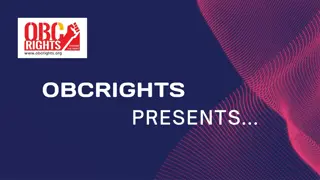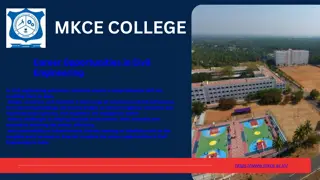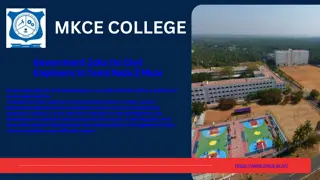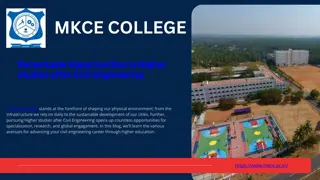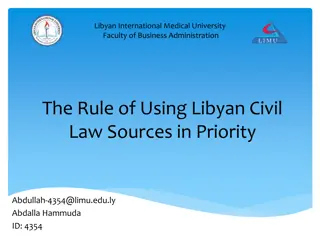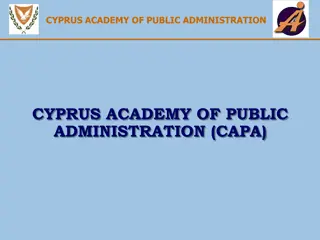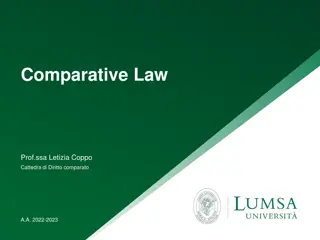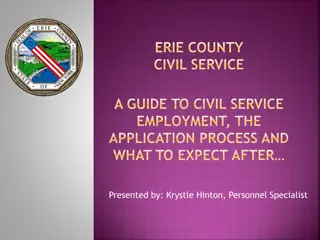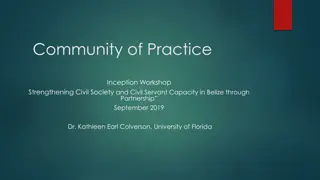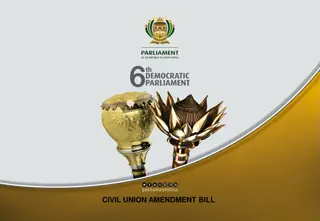The Future of Learning in the Civil Service
Explore the landscape of learning within the Civil Service, delving into agendas, departmental structures, and key professions. Gain insights into the roles, functions, and diverse workforce shaping the future of this crucial sector.
Download Presentation

Please find below an Image/Link to download the presentation.
The content on the website is provided AS IS for your information and personal use only. It may not be sold, licensed, or shared on other websites without obtaining consent from the author.If you encounter any issues during the download, it is possible that the publisher has removed the file from their server.
You are allowed to download the files provided on this website for personal or commercial use, subject to the condition that they are used lawfully. All files are the property of their respective owners.
The content on the website is provided AS IS for your information and personal use only. It may not be sold, licensed, or shared on other websites without obtaining consent from the author.
E N D
Presentation Transcript
Learning 2020 The future of learning in the Civil Service May 2019
Agenda Time Session Lead 12:00 - 12:30 Arrival and refreshments NA 12:30 - 12:40 1. Intros and session overview Simon Mowat, Cabinet Office 12:40 - 13:00 2. L2020 overview Marina Bolton, Cabinet Office 13:00 - 13:30 4. Our requirements Nick Walker, Cabinet Office 13:30 - 13:45 Comfort break NA 13:45 - 14:05 5. Our delivery model and proposed contracting model Nick Walker, Cabinet Office 14:05 - 14.15 6. Procurement Pat Desmond, Crown Commercial Service 14:15 - 14:30 7. Review and close Nick Walker, Cabinet Office
Welcome Marina Bolton, Director Organisation Development, Design and Learning, Cabinet Office
The Civil Service Civil Service employment on 31 March 2018 was 430,075 Around 1 in 4 works part time Under 20% work in London Around 35-40% of civil servants work in an administrative grade. Approximately 267,000 people in management grades 4,000 Senior Civil Servants with a high degree of leadership responsibility. (gov.uk: About Us)
Civil Service Departments, Functions and Professions PROFESSIONS: Policy Profession Operational Delivery Profession Counter Fraud Profession Digital, Data and Technology Profession Government Communication Service Government Corporate Finance Government Economic Service Government Finance Government Legal Service Government Operational Research Service Government Project Delivery Profession Government Property Profession Government Science and Engineering Government Security Profession Government Social Research Government Statistical Service Government Veterinary Profession Human Resources Intelligence Assessment Internal Audit International Trade Profession Knowledge & Information Management Medical Profession Planning Inspectors Planning Profession Policy Profession Procurement Profession Psychology Profession Tax Profession Ministerial Departments (25) Non Ministerial Departments (20) 405 Agencies and Other FUNCTIONS: Analysis Commercial Communications Digital Finance Fraud, Error, Debts and Grants Human Resources Internal Audit Legal Project Delivery Property Security Bodies Functions (12) Professions (28)
Organisational Development Design & Learning (ODD&L) We are responsible for delivering a formal core learning provision to meet the Civil Service s learning needs. Cabinet Office We do this by working with commercial partners to provide a core learning provision for the Civil Service s departments, functions and professions. CSHR This commercial approach reduces procurement duplication and leads to improved value for money through realising economies of scale. ODD&L
Our requirements Nick Walker, Deputy Director Organisation Development, Design and Learning, Cabinet Office
Our history Civil Service Learning (CSL) was established in April 2011 with the aim of sourcing a generic Learning and Development offer for the Civil Service through a central procurement approach to provide better value for money. In April 2012, a single platform for learning with a main contractor to deliver face-to-face learning, e-learning and a catalogue of resources. In 2015, separate contracts were established to support Senior Civil Service (SCS) development and below SCS to provide core learning across the CS. In 2017, an additional contract for access to professional development and specialist qualifications was established.
Current usage Key Facts Volume of booking circa 440k bookings (from 2016 - Jan 2019) Booking always peak in quarter 4 (Jan to March) Biggest department users by volume HM Revenue and Customs Department of Work and Pensions Ministry of Defence Ministry of Justice Estimated spend through centralised contracts 290m
Learning culture - creating the conditions A commitment to improvement and growth A civil service that continuously develops and learns from experiences - our successes and our failures - at an individual, collective, and organisational level. We share knowledge, experience and expertise throughout the organisation A culture of continuous feedback, reflection and monitoring A framework for focussing our activity and monitoring progress towards our ambition. Creating these conditions requires a whole system approach, and goes beyond the work of the centre . We know what we need to be good at We know how to learn, develop and grow Engaging in high-impact learning experiences
Our aspirations for the future To secure a cost effective and compliant route to market establishing a clear commercial strategy for any future cross Civil Service learning provision from 2020 and beyond; Access to strong support infrastructure for booking, inclusive of a service centre for bookings, key MI data, helpdesks, account management and payment mechanisms; A delivery model that meets the needs of Civil Servants working across the UK and those who are based in international locations, and which takes into account the Civil Service s future direction and current context (e.g. Places for Growth, EU Exit, Workforce Projections); All learning will meet accessibility standards; A flexible model where we can create common learning with external partners, buy off- the-shelf, or ask for provider to deliver crown IP; Increase ability to adapt learning to the rapidly changing environment, enable departments and professions to contextualise; and Improve evidence of learning- impact.
What we have learned from our informal market engagement? Our preferred model for a prime provider is commercially viable through partnering with multiple providers in a consortia approach managed by an overall prime provider; Our future model has the potential to engage small to medium sized enterprises to support the Civil Service learning agenda, albeit this is potentially through a consortium approach with a larger prime provider to mitigate the risk of supporting such a large scale service; Do not underestimate the governance required to deliver the service integration work and to think through what role CSHR wants to play within that; Some organisations are keen to work with the Civil Service in a partnership approach on high profile strategic change programmes rather than simply the delivery of training.
What we have learned from our informal market engagement? Comprehensive supply chain management is a complex element of what we are buying in a highly competitive market; To ensure a positive customer experience, we need to consider the end-to-end service integration piece inclusive of marketing MI, account management etc. rather than just a booking facility for learning A portfolio level approach to pricing and management of learning is the most commercially viable option in the open market; Innovation in the managed service market has developed; Striking the right balance between agility and price will remain a consistent challenge.
Priority learning requirements The consistent message from evidence provided by professions/functions and departments is that the common requirements required from the contract are: Basic management skills, leadership development to support career transition points and leadership board development; Change leadership; Personal effectiveness - including Civil Service Behaviours and mandatory learning; Executive coaching; Easy access to specialist providers to support professions and functions growth plans and department specific needs; and Facilitation provision to support academies and deliver existing learning content. 1. 2. 3. 4. 5. 6.
Specification: Summary of Need (1) Leadership and Management: The skills needed to lead and manage in the Civil Service: Basic management skills (e.g. Management Fundamentals, enhanced team building and engagement); Leadership - supporting people to take on leadership roles - in line with leadership strategy and department context (offering the ability to contextualise but provide consistent standards); Highly skilled external leadership consultants/ facilitators to work in partnership with the Leadership Academy to support senior leadership teams. Change Leadership: Developing skills to lead and manage change in uncertainty and complexity: Developing personal coping strategies - flexibility, agility, resilience; Support leaders manage change including: crisis management, transformation, and specifically to support EU Exit; Support departmental change programmes (customised learning to support change initiatives); and Support colleagues to respond to impact of automation and AI. Personal Effectiveness: All Civil Servants need to develop skills for the future (in line with Success Profiles): Decision making, communicating and influencing, customer service, management and work prioritisation, collaborating and partnering and networking; Required learning: e.g. Health and Safety, Responsible for information, diversity and inclusion; Data analysis, interpretation and visualisation; Resilience and wellbeing; and Corporate induction.
Specification: Summary of Need (2) Executive Coaching: A solution through which SCS can access quality executive coaches: Access to high quality coaches; Cost effective rate (minimal management overheads); Senior leaders often request specific coaches - current model makes it difficult to bring on board new coaches as needed. Professions. Functions & Specialisms: Skills development for all Civil Servants in: Project management, commercial skills, financial management, digital skills and IT skills (eg Excel, Word etc); Understanding Parliament; International learning, inc. UK s role post-EU Exit; Support internal delivery for Policy profession - and others; and Other role specific development e.g. mediation training. Profession/ Function specific: Easy route to market to work with specialist providers to meet needs; Ability to access small and medium size enterprises to find the best and most cost effective providers.
Our delivery model Nick Walker, Deputy Director Organisation Development, Design and Learning
Critical Success Factors set out in Business Case Continuity of service High quality learning Core CS strategies Service delivery Value for Money High quality access to strong support infrastructure for booking, inclusive of a service centre for bookings, key MI data, helpdesks, account management and payment mechanisms To secure a cost effective and compliant route to market establishing a clear commercial strategy for any future cross Civil Service learning provision from 2020 and beyond that provides cost efficiencies across the system. All learning will meet accessibility standards; A flexible model where we can create common learning with external partners, buy of the shelf, or ask for provider to deliver crown IP; Increase ability to adapt learning to the rapidly changing environment, enable departments and professions to contextualise; and Improve evidence of learning- impact. A delivery model that meets the needs of Civil Servants working across the UK and those who are based in international locations, and which takes into account the Civil Service s future direction and current context (e.g. Places for Growth, EU Exit, Workforce Projections) Impact on the end user throughout any transition period between services is minimised with no gap in service provision with a phased approach to transition
Integrated delivery approach A provider/group of providers, whose relationship is managed centrally by the CSHR supplier engagement team, who would deliver and co-ordinate all support services for delivering common learning needs identified through the learning 2020 consultation under the following buckets of work: Core curriculum delivery: for SCS, below-SCS inclusive of leadership and management, awareness-level learning for professions, personal effectiveness; Professions commodity learning: professions-based learning and any specific off-the-shelf department, or department- specific product; Learning consultancy services: for bespoke and large-scale change and learning programmes; and Subject matter experts: high value individuals/ single providers who are able to provide expertise and support for senior colleagues, including: coaches, facilitators, specialist speakers. Key principles of model include: Mix of commercial models to offer increased flexibility Social learning embedded as a key design principle as per strategy Straight forward direct purchasing system for commoditised learning for professions Increased flexibility and option to work with a wider range of providers Option to work with a wider range of individuals and subject matter experts Ability to reuse Crown IP with reduced design costs One service integrator across whole piece for better, more straight forward service delivery and customer experience Relationships with providers are centrally managed by CSHR supplier engagement team
Service integrator and thematic needs Service integrator - One overall provider that would be the single route to access services. Providing a full service integration inclusive of: service centre, evaluation, MI, supply chain management Core curriculum delivery Subject matter experts Commodity learning Learning consultancy Delivery through a consultancy model of consultancy services for bespoke, large scale change and learning programmes at department and profession level inclusive of learning design, development of tools etc. Delivery and continuous improvement through a range of providers of Crown IP core curriculum products for SCS and below SCS inclusive of: leadership and management, awareness level learning for professions, personal effectiveness etc. Delivery of professions-based learning and any specific off the shelf department or department Access to high value individuals/ single providers that are able to provide subject matter expertise and 1:1 support for senior colleagues via a simple route to market. This could include: - Coaches - Facilitators - Specialist speakers etc. Vestibulum congue tempus specific products (for example Prince2) Lorem ipsum dolor sit amet, consectetur adipiscing elit, sed do eiusmod tempor.
Service integrator A full service wrap/ integrator for delivery of a professional managed learning service (inclusive of helpdesk, MI, bookings, cohort management, supply chain management, project management, facilitator management, evaluation etc.). Quality booking services to provide personalised learner support; Consistent and accurate MI reporting to be able to analyse usage, engagement and evaluating the impact of learning; Security of data and systems, GDPR compliant and meeting CS protocols; Flexible payment process and accurate invoicing; Ability to deliver learning irrespective of geographical location, including overseas via a variety of delivery methods; Support for workplace adjustments to enable learners to access learning in the best way to achieve learning goals; and Route to market for procured goods and services, to get expert providers that offer value for money. Impactful marketing of learning so learners can easily identify relevant learning needs. Venue booking service.
Core curriculum Delivery of a core set of high quality, value for money Crown IP learning products comprising a core learning offer at all grades that are continuously improved, taking new and innovative approaches to support learning (social learning, AI, job support tools). A delivery model that meets the needs of Civil Servants working across the UK and those who are based in international locations, and which takes into account the Civil Service s future direction and current context Ensuring all learning meets accessibility standards (including WAC2.1 for online learning) Able to customise (at least 20% without additional charges) to meet specific department/profession context. Work with the Curriculum Board to identify needs and design new learning for core curriculum taking a risk and reward approach to recoup design on high volume core learning. Develop online materials that will offer bite size learning via the Learning platform for Government.
Professions and commodities learning A route to market that enables user to procure learning provision where a core offer does not meet needs eg off the shelf learning products and for bespoke/ specific learning needs (access to subject matter experts etc.). Engaging with a range of SMEs to support delivery to be able to access specialist providers. Access to accredited programmes via recognised professional bodies. Ability to manage contractual arrangements with providers, managing the relationship with providers to ensure high quality and reducing duplication of design and development of new provision to ensure value for money. Invoicing departments monthly and paying providers within Government agreed timescales.
Learning consultancy Strategic learning transformation consultancy services (inclusive of project management, learning design, quality assurance, delivery etc.) Targeted consultancy service to develop and deliver department or profession specific learning interventions Evidence gathering of common learning needs to inform curriculum board and minimise duplication of provision (across departments and professions). High quality MI and evaluation.
Subject matter experts Access to expert speakers Expert facilitators to support department/profession specific learning through the Leadership Academy (or professions Academies) offering a cost effective rates for delivery and design. Executive coaching Coordination of recruitment of high quality individual coaches. Manage the contracts and quality of provision. Encourage competitive rates (ie. minimal management overheads) Support/ concierge service to support senior leaders find the right coach Regular review and update of coaching database to meet changing demands Work collaborative with CSL and internal coaches to build a community who share learning and support the development of a coaching culture User friendly booking system and flexible payment options, meeting SLAs and Government guidelines for prompt payment of providers.
Requirement for partners/providers Ability to meet all Critical Success Factors in the business case from day 1, guaranteeing continuity of service; Demonstrable and validatable expertise in provision of the underlying service; Ability to take on full commercial risk transfer for service provision, including complaints; management, warranties and indemnities for performance; An explanation of how they are bringing cutting edge technology and approaches to the needs set out; and For internal service providers, the ability to deliver either the entirety of training/learning/curriculum within a thematic need, or the ability to create a viable and credible mixed economy of provision which sources suppliers in a compliant way.
What we have learned from our informal market engagement? Our preferred model for a prime provider is commercially viable through partnering with multiple providers in a consortia approach managed by an overall prime provider; Our future model has the potential to engage small to medium sized enterprises to support the Civil Service learning agenda, albeit this is potentially through a consortium approach with a larger prime provider to mitigate the risk of supporting such a large scale service; Do not underestimate the governance required to deliver the service integration work and to think through what role CSHR wants to play within that; Some organisations are keen to work with the Civil Service in a partnership approach on high profile strategic change programmes rather than simply the delivery of training.
What we have learned from our informal market engagement? Comprehensive supply chain management is a complex element of what we are buying in a highly competitive market; To ensure a positive customer experience, we need to consider the end-to-end service integration piece inclusive of marketing MI, account management etc. rather than just a booking facility for learning A portfolio level approach to pricing and management of learning is the most commercially viable option in the open market; Innovation in the managed service market has developed; Striking the right balance between agility and price will remain a consistent challenge.
Our proposed contracting model Nick Walker, Deputy Director Organisation Development, Design and Learning
Proposed Option 1 Contract 1 = Service Integrator + Core curriculum Contract 4 Subject Matter Experts Core Contract 2 - Commodity Learning Contract 3 - Learning Consultancy Curriculum 32 Civil Service HR - An overview
Proposed Option 2 Contract 1 Service Integrator + Core curriculum Contract 2 - Commodity Learning ? ? Contract 4 - Subject Matter Experts Core Contract 3 - Learning Consultancy Curriculum Framework? DPS? 33 Civil Service HR - An overview
Proposed Option 3 Contract 1 Service Integrator + Core curriculum Delivery + 1 other Contract 2 1 of the following 1 of the following 1 of the following 1 - Commodity Learning 2 Learning Consultancy 3 Subject Matter Experts 1 Commodity Learning 2 Learning Consultancy 3 Subject Matter Experts 1 Commodity Learning 2 Learning Consultancy 3 Subject Matter Experts Core Curriculum Delivery 34 Civil Service HR - An overview
Procurement: timelines and processes Pat Desmond Crown Commercial Service
Review and close Nick Walker, Deputy Director Organisation Development, Design and Learning
Continuing the conversations 1:1s Your feedback/ comments
And finally ... Feedback forms Thank you for coming!
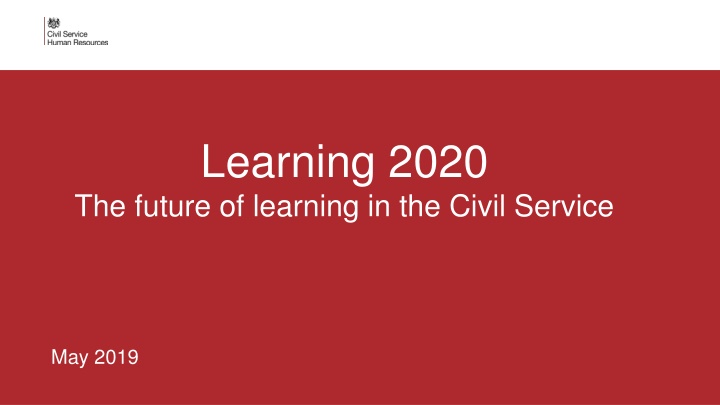

![❤[PDF]⚡ Civil War Talks: Further Reminiscences of George S. Bernard and His Fel](/thumb/20551/pdf-civil-war-talks-further-reminiscences-of-george-s-bernard-and-his-fel.jpg)


